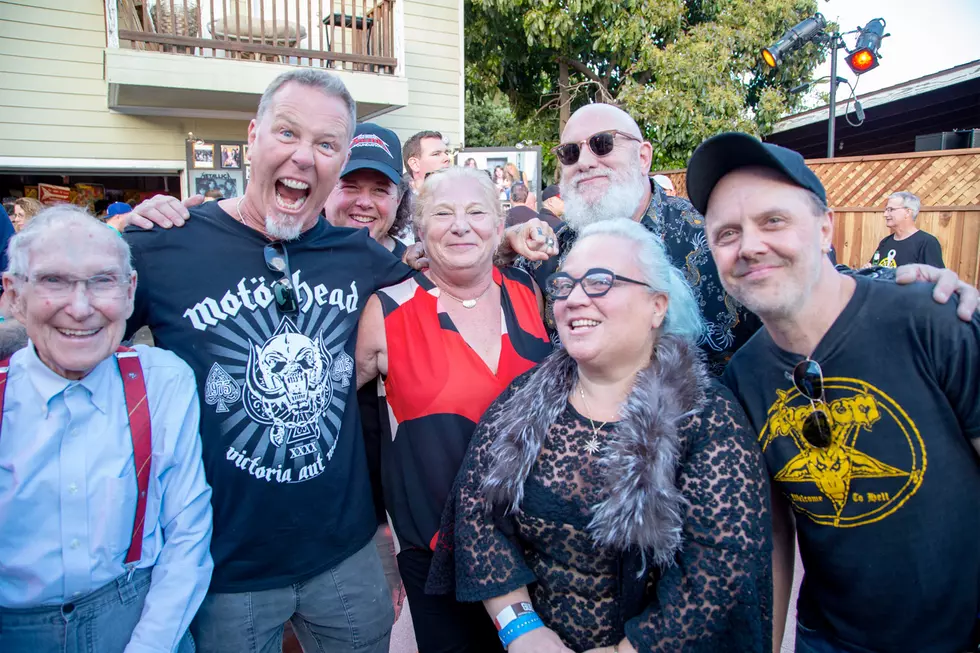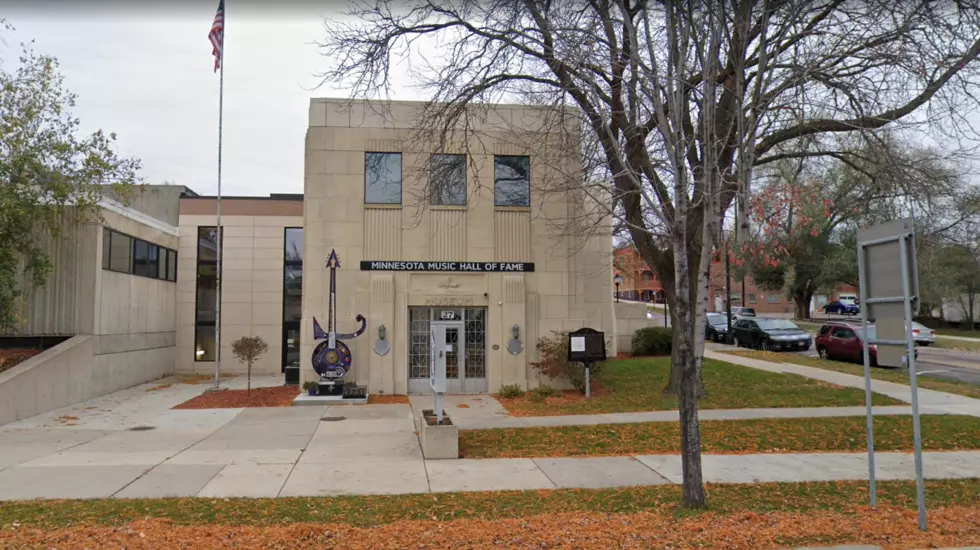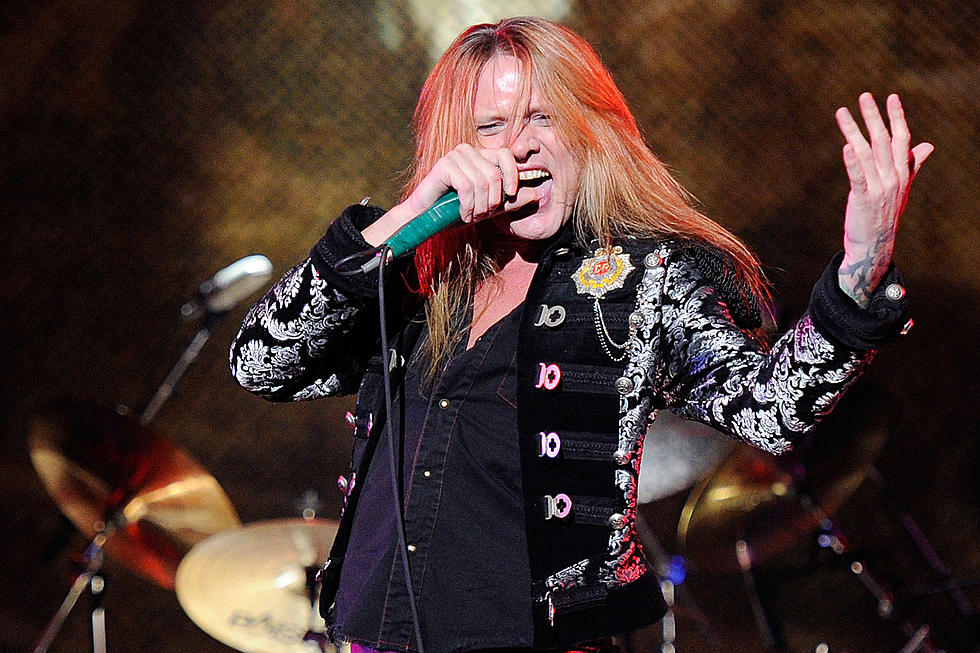
Metallica, the Zazulas and Megaforce: How Thrash Went Mainstream
Metallica may have been nothing more than a flash in the pan without the help of Marsha and Jonny Zazula, two deeply insightful business people with a dedication to the underground rock scene.
The founders of Megaforce Records died about a year apart: Marsha in January 2021 and Jonny in February 2022. "We would not be where we are today without the two of them," Metallica said in a news release announcing a tribute concert in the Zazulas' honor. Metallica is one of many figures in the metal scene who owe the couple a debt of gratitude. Another is Maria Ferrero, the owner of Adrenaline PR, which handles promotions for bands including John 5 and Tetrarch.
"They were my best friends on the planet," she said. "We've been through everything together."
Ferrero first met the Zazulas in 1982, when she was just 15. They lived next door to a friend of hers at 60 York St. in Old Bridge, N.J., a suburban town then on the edge of New York City's ever-growing sprawl. She bought a Motorhead album from Jonny out of his garage. At the time, Motorhead's records were hard to find in the U.S., but he had a relationship with international record importers in New York City, where Jonny and Marsha grew up.
Watch Metallica Play 'Seek and Destroy' in 1983
Ferrero was thrilled to learn that the couple had also opened Rock 'n Roll Heaven, a whole stall full of underground metal records located at a flea market in nearby East Brunswick, N.J. It was an important gathering place for the dissatisfied young men who made up most of the local metal scene.
At the time, this part of Central Jersey was much more blue-collar. That made it a perfect place for a hungry young band with angry music to make its mark. "Working class men were being side-tracked," said Deena Weinstein, a sociologist at DePaul University who studied the thrash scene extensively. "The whole steel industry was being outsourced," she added. "These kids were being forced to go to college. They couldn't follow in their fathers' footsteps and be a worker during the day and listen to their favorite music at night."
JONNY HEARS METALLICA
In 1982, one of Metallica's earliest fans came to Rock 'n Roll Heaven and forced Jonny to put on the band's demo, No Life 'til Leather. He was reluctant to play it at first but immediately became enthralled despite its rough production. "I basically said, 'What the fuck?'" Zazula recalled in his 2019 autobiography. "It was just so amazing. I stood there stunned."
Jonny knew he had struck gold. He envisioned Metallica as the American answer to European acts like Motorhead, Venom and Mercyful Fate, which were among the heaviest around. That's why he quickly got in touch with the band and sent them $1,500 for a U-Haul to come out east.
Still, he couldn't broker a deal for Metallica with an existing label. So the Zazulas started Megaforce with the sole goal of putting out the band's first studio album Kill 'Em All in 1983.
Listen to Metallica's 'Jump in the Fire'
The couple bet a lot on Metallica's success. Jonny's career on Wall Street ended after he and his business partners were convicted of passing off scrap metal as a more expensive material. When Ferrero met him, he was still finishing his six-month sentence at a halfway house in Newark and was allowed home only on weekends. To start Megaforce, the Zazulas took out a second mortgage on their York Street home.
That's why Jonny was desperate to get the band on the radio for the first time in 1984. He approached a young Eddie Trunk, who was a DJ at New Jersey's WDHA-FM at the time, with the single "Jump in the Fire." "I'm in a spot," Zazula said after cornering Trunk in the studio. "Will you please play this band? I'm not leaving until you do."
Trunk relented since he sensed that was the only way to get Jonny out of the studio. In return, Zazula promised to hire him at Megaforce someday, if Metallica was a success – which he did two years later. Trunk eventually became the label's vice president. He still has the single to this day, which has a handwritten thank you note from Jonny.
'HE HAD A VISION'
In 1984, Metallica was too heavy for even some of the most seasoned metal heads, including Trunk. "I'd never heard anything like Metallica before," he said. "It was super extreme to me. I didn't know what was going on." Ferrero thinks the band's "rawness" is what resonated with Zazula. "He saw how people were losing it to them," said Ray Dill, one of the first Rock 'n Roll Heaven customers Jonny introduced to Metallica. "He had a vision."
Charlie Benante – the drummer of Anthrax, which released their debut album Fistful of Metal on Megaforce in 1984 – thinks Zazula's eclectic tastes and roots as a homeless New York City hippie in the '60s may have contributed to this insight. The Zazulas loved the Grateful Dead and were "big stoners," Trunk said. "Metal was just the ['60s] counterculture with heavier overtones and different drugs," Weinstein said. "A whole lot of beer, some downers and a lot of pot."
In the early days of Megaforce, the Zazulas didn't have much separation between their personal and business lives. The label operated out of the basement of the home they had just mortgaged, where they were raising their two daughters Rikki and Blaire. Danielle, Jonny's daughter from his first marriage, would also visit.
Listen to Anthrax's 'Soldiers of Metal'
Ferrero had a different story of how the Zazulas met than the one Jonny shared in his autobiography. She said he met Marsha through a drug dealer she once dated. Jonny's first wife was a customer of the dealer. She brought Jonny along to buy some drugs. He and Marsha eventually fell in love. The couple stayed together until she died.
While there was some bitterness between Jonny and his first wife early on, Ferrero said the blended family moved past that for the sake of their children. Ferrero started out babysitting for the Zazulas, but she quickly became responsible for manning the label's phones and sending out promotional letters. "You're the publicist," Jonny told her at age 17 after she helped him get Anthrax some good press in Europe.
"I was just a rebellious kid," Ferrero said. "They gave me an outlet to exercise my passion." She described Marsha as the level-headed decision-maker who kept Jonny grounded. "They had a lot of arguments, but there was a deep love and connection," Trunk said. To many of the musicians on Megaforce, Marsha was a maternal figure. Benante remembered her taking care of him on a trip to Amsterdam when he got too high off an edible. He also recalled discussing album artwork and scheduling tours with her. She handled that while Jonny focused on the numbers and served as the label's public face.
THE OLD BRIDGE MILITIA
When the Zazulas first brought Metallica to the Northeast, where they were based for a time in between tours, Jonny and Marsha hosted the band at their home. But their drunken antics quickly became too much for the young family. Metallica spent time at Anthrax's rehearsal space in Queens, but Jonny also enlisted the help of the "Old Bridge Militia" – an informal group of local metal heads including Dill and Joe Chimienti, another frequent customer at Rock 'n Roll Heaven. "We were just the ones that had the parties," Chimienti said.
Metallica lived with both of them, but their craziest nights happened at a big house Chimienti rented in rural Farmingdale, N.J. Members of all the bands in thrash's "Big Four" hung out there at one point or another. When Metallica first stayed with Chimienti in 1983, Dave Mustaine and Cliff Burton were still members. That lineup played one of the band's first-ever sets on the East Coast in the farmhouse's spare upstairs bedroom. Lars Ulrich played so hard that he broke both of his sticks and started bleeding all over Chimienti's kit.
Watch Testament's Video for Perform 'Souls of Black'
Everyone saw firsthand how Mustaine's drunken behavior led to him being fired by Metallica. After he got back to California, Mustaine was still determined to make it as a musician and started Megadeth. The Zazulas helped Metallica fly out Kirk Hammett, who gave up his gig in the Bay Area group Exodus. The new lineup played its first set in Chimienti's basement.
Anthrax also spent some time at the house. Before the band got signed, they frequently drove down to New Jersey in the hopes of getting Jonny's attention. Slayer stayed at the farmhouse in 1984 after Jonny introduced Dill and Chimienti to Tom Araya, who had stopped at Rock 'n Roll Heaven while on tour.
METALLICA LEAVES FOR ELEKTRA
Metallica played a lot of shows in New Jersey around this time, which had a big impact on the local rock scene. "The whole tide turned toward metal," said Mark Tornillo, the frontman of Accept who was then in T.T. Quick, which started as a hard-rock cover band.
T.T. Quick and many of the other artists in the New Jersey club scene switched over to writing originals. At the same time, a new crop of local thrash bands like Overkill and Whiplash was coming up. When Megaforce released Metallica's Ride the Lightning in the summer of 1984, the major labels had already taken an interest in the band. Less than a week after the album was released, they were picked up by Elektra Records following a sold-out show at the Roseland Ballroom in New York City.
This sent Jonny into a deep depression, but that was far from the end of Megaforce. The Zazulas got a big settlement from Elektra, which they plowed back into Megaforce, their store and their other company Crazed Management. The label moved out of their home and into an office in East Brunswick. Rock 'n Roll Heaven was relocated from the flea market to a proper storefront in Clark, N.J.
Although Anthrax signed to Island Records ahead of 1985's Spreading the Disease, the Zazulas continued to manage the band for nearly a decade. Jonny also struck a deal with Island where he got to keep Megaforce's name on the group's next three studio albums, even though he was no longer heavily involved with recording or production. "It was mailbox money," Trunk said.
Watch Anthrax's Video for 'Madhouse'
This was also when the Zazulas secured a distribution agreement for the rest of their artists with Atlantic Records, which became Megaforce's parent label. Megaforce put out other seminal metal '80s thrash albums by bands like Exciter, Overkill and Testament. The label also released Speak English or Die by the crossover thrash band S.O.D., which was mostly made up of Anthrax members, and the power metal band Manowar's album Into Glory Ride.
But Jonny's taste in rock, and music in general, was much more diverse. He never lost his interest in more traditional hard rock and heavy metal sounds, which is why he also signed bands like T.T. Quick, King's X and Raven. Kiss guitarist Ace Frehley's solo project Frehley's Comet was also on the label.
As Megaforce entered the '90s, Trunk said Jonny became more focused on Crazed Management, which secured clients like the industrial metal act Ministry, whom Ferrero signed, and the underground but very influential grunge band TAD. With Zazula focused on Crazed Management, he left Trunk in charge of Megaforce. But Trunk said Jonny wasn't willing to give him the authority to make big decisions, which made it a challenge for him to manage Megaforce's relationship with Atlantic, which eventually lapsed.
LOSING MOMENTUM
In the early '90s, the entire metal scene lost a lot of ground to alternative rock. One part of this could be blamed on the power ballads MTV demanded of metal bands, which created a "bubble of ridiculous commercialization" that turned many fans off, said Mike Barnett, a music professor at the University of Colorado Boulder who played drums in the Pennsylvania thrash act Phantom Crew.
Ultimately, however, he said it was out of their control. "I don't think thrash bands had much to do with their own demise," Barnett said. "I think what happened to the whole scene was grunge."
Megaforce was also facing more competition in its core market. In 1983, Metallica had very limited options for getting signed because there were so few independent labels in the metal scene. By the end of the decade, the number had grown. Megaforce now had to contend with boutique competitors like Roadrunner, Century Media and Nuclear Blast.
Jonny started using Megaforce to indulge in his more eclectic tastes. Over the years, the label signed the jam band the Disco Biscuits, the cowpunk singer-songwriter Hank Williams III and even a classical pianist who released an album of Bruce Springsteen covers.
Megaforce's longtime fans were still looking for the metal and hard rock that made the label famous. "It just got too diverse," said Trunk, who left Megaforce in 1991. "Those records weren't selling."
AFTER THE END
In 2001, the Zazulas sold Megaforce to longtime employee Missi Callazzo, who started at the label in 1989. Several classic acts remained on the label.
The Zazulas moved out of New Jersey. They lived in New Hope, Penn., for a time and eventually moved to Clermont, Fla. They had done well for themselves and were living comfortably. Ferrero said they bought a "beautiful" house, which had a nice view of the sunset every night.
Into the 21st century, the couple and the artists they supported continued to hold a lot of cachets. T.T. Quick never saw much commercial success, and eventually, Tornillo left the music industry and became a union electrician. In 2009, however, his Megaforce glory days got him a call to come and jam with members of Accept. The band was reuniting, but their original singer Udo Dirkschneider was no longer going to be part of the project. Tornillo had bronchitis, but he powered through. The rest of the band was impressed and hired him as Accept's singer.
Watch Accept's Video for 'The Abyss'
Jonny slowed down in his final years, but it was hard for him to stop working. In 2014, he joined Testament frontman Chuck Billy at a management company Ferrero started called Breaking Bands. The pandemic was hard on the Zazulas. They both became seriously ill, Marsha with cancer and Jonny with a rare neurological condition.
But they still kept in touch. Marsha and Ferrero would get on Facetime and smoke joints and laugh together. "It just really sucks without them," she said through tears. "I loved them so much."
Top 50 Classic Heavy Metal Albums
Why John Bush Turned Down Metallica
More From KYBB-FM / B102.7










